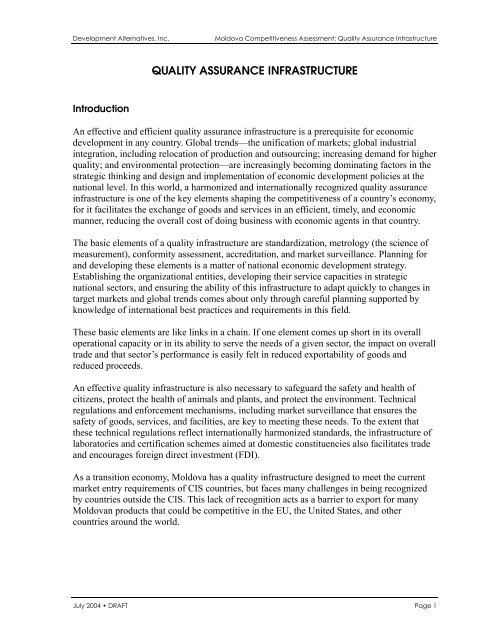Assessing Competitiveness In Moldova's Economy - Economic Growth
Assessing Competitiveness In Moldova's Economy - Economic Growth
Assessing Competitiveness In Moldova's Economy - Economic Growth
You also want an ePaper? Increase the reach of your titles
YUMPU automatically turns print PDFs into web optimized ePapers that Google loves.
Development Alternatives, <strong>In</strong>c. Moldova <strong>Competitiveness</strong> Assessment: Quality Assurance <strong>In</strong>frastructure<br />
<strong>In</strong>troduction<br />
QUALITY ASSURANCE INFRASTRUCTURE<br />
An effective and efficient quality assurance infrastructure is a prerequisite for economic<br />
development in any country. Global trends—the unification of markets; global industrial<br />
integration, including relocation of production and outsourcing; increasing demand for higher<br />
quality; and environmental protection—are increasingly becoming dominating factors in the<br />
strategic thinking and design and implementation of economic development policies at the<br />
national level. <strong>In</strong> this world, a harmonized and internationally recognized quality assurance<br />
infrastructure is one of the key elements shaping the competitiveness of a country’s economy,<br />
for it facilitates the exchange of goods and services in an efficient, timely, and economic<br />
manner, reducing the overall cost of doing business with economic agents in that country.<br />
The basic elements of a quality infrastructure are standardization, metrology (the science of<br />
measurement), conformity assessment, accreditation, and market surveillance. Planning for<br />
and developing these elements is a matter of national economic development strategy.<br />
Establishing the organizational entities, developing their service capacities in strategic<br />
national sectors, and ensuring the ability of this infrastructure to adapt quickly to changes in<br />
target markets and global trends comes about only through careful planning supported by<br />
knowledge of international best practices and requirements in this field.<br />
These basic elements are like links in a chain. If one element comes up short in its overall<br />
operational capacity or in its ability to serve the needs of a given sector, the impact on overall<br />
trade and that sector’s performance is easily felt in reduced exportability of goods and<br />
reduced proceeds.<br />
An effective quality infrastructure is also necessary to safeguard the safety and health of<br />
citizens, protect the health of animals and plants, and protect the environment. Technical<br />
regulations and enforcement mechanisms, including market surveillance that ensures the<br />
safety of goods, services, and facilities, are key to meeting these needs. To the extent that<br />
these technical regulations reflect internationally harmonized standards, the infrastructure of<br />
laboratories and certification schemes aimed at domestic constituencies also facilitates trade<br />
and encourages foreign direct investment (FDI).<br />
As a transition economy, Moldova has a quality infrastructure designed to meet the current<br />
market entry requirements of CIS countries, but faces many challenges in being recognized<br />
by countries outside the CIS. This lack of recognition acts as a barrier to export for many<br />
Moldovan products that could be competitive in the EU, the United States, and other<br />
countries around the world.<br />
July 2004 • DRAFT Page 1
















